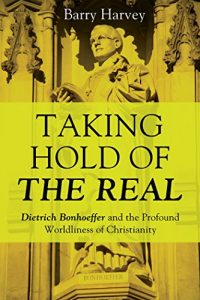Dietrich Bonhoeffer writes in one of his last prison letters that he had "come to know and understand more and more the profound this-worldliness of Christianity." In Taking Hold of the Real, Barry Harvey engages in constructive conversation with Bonhoeffer, contending that the "shallow and banal this-worldliness" of modern society is ordered to a significant degree around the social technologies of religion, culture, and race. These mechanisms displace human beings from their traditional connections with particular locales, and relocate them in their "proper places" as determined by the nation-state and capitalist markets. Christians are called to participate in the profound this-worldliness that breaks into the world in the apocalyptic action of Jesus Christ, a form of life that requires discipline and an understanding of death and resurrection. The church is a sacrament of this new humanity, performing for all to hear the polyphony of life that was prefigured in the Old Testament and now is realized in Christ. Unable to find a faithful form of this-worldliness in wartime Germany, Bonhoeffer joined the conspiracy against Hitler, a decision aptly contrasted with a small French church that, prepared by its life together over many generations, saved thousands of Jewish lives.
"More than just another exposition of Bonhoeffer's thought or examination of his life, this book is a creative appropriation of Bonhoeffer for our times. Harvey uses his sensitive and thorough understanding of Bonhoeffer to show the irony of modernity's claim to have reached maturity, and to guide Christians toward the kind of worldliness necessary to deal with the worldliness of a secular age. This book is a fascinating read."
--William T. Cavanaugh, Director, Center for World Catholicism and Intercultural Theology, DePaul University
"Harvey's fine study offers a mature and highly responsible interpretation of the central elements of Bonhoeffer's theology in creative conservation with leading theologians and theorists of our day . . . Here is a work from which we can learn what ought never to have been forgotten: that following where Christ leads drives Christians ever more profoundly into the realities of the world for its sake."
--Philip G. Ziegler, Senior Lecturer in Systematic Theology, School of Divinity, History and Philosophy, King's College, University of Aberdeen
"In this elegantly written book, Harvey indeed shows us why Bonhoeffer's theology remains pivotal for our own time, but he does much more. By establishing the participatory and sacramental nature of Bonhoeffer's theology, Harvey succeeds in showing how still-debated notions like 'this-worldliness' and 'religionless Christianity' arise from Bonhoeffer's overall eschatological framework. Everyone interested in Bonhoeffer, including experts, needs to read this book!"
--Jens Zimmermann, Professor in the Humanities and Canada Research Chair for Religion, Culture and Interpretation
Barry Harvey is Professor of Theology in the Honors College and the Graduate Program in Religion at Baylor University. His other books include Politics of the Theological, Another City, and Can These Bones Live? He has served on the Board of the International Bonhoeffer Society, English Language Section, and the Editorial Board of the Dietrich Bonhoeffer Works.
"More than just another exposition of Bonhoeffer's thought or examination of his life, this book is a creative appropriation of Bonhoeffer for our times. Harvey uses his sensitive and thorough understanding of Bonhoeffer to show the irony of modernity's claim to have reached maturity, and to guide Christians toward the kind of worldliness necessary to deal with the worldliness of a secular age. This book is a fascinating read."
--William T. Cavanaugh, Director, Center for World Catholicism and Intercultural Theology, DePaul University
"Harvey's fine study offers a mature and highly responsible interpretation of the central elements of Bonhoeffer's theology in creative conservation with leading theologians and theorists of our day . . . Here is a work from which we can learn what ought never to have been forgotten: that following where Christ leads drives Christians ever more profoundly into the realities of the world for its sake."
--Philip G. Ziegler, Senior Lecturer in Systematic Theology, School of Divinity, History and Philosophy, King's College, University of Aberdeen
"In this elegantly written book, Harvey indeed shows us why Bonhoeffer's theology remains pivotal for our own time, but he does much more. By establishing the participatory and sacramental nature of Bonhoeffer's theology, Harvey succeeds in showing how still-debated notions like 'this-worldliness' and 'religionless Christianity' arise from Bonhoeffer's overall eschatological framework. Everyone interested in Bonhoeffer, including experts, needs to read this book!"
--Jens Zimmermann, Professor in the Humanities and Canada Research Chair for Religion, Culture and Interpretation
Barry Harvey is Professor of Theology in the Honors College and the Graduate Program in Religion at Baylor University. His other books include Politics of the Theological, Another City, and Can These Bones Live? He has served on the Board of the International Bonhoeffer Society, English Language Section, and the Editorial Board of the Dietrich Bonhoeffer Works.






